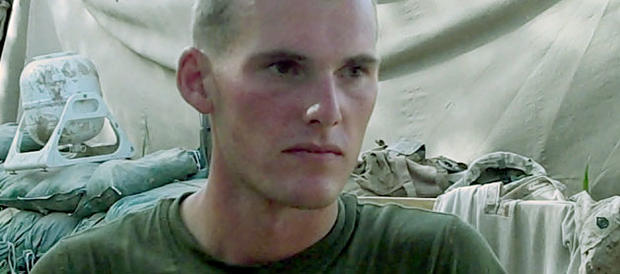A Day in the Life: Wardak, Afghanistan
As part of our continuing coverage of "Afghanistan: the Road Ahead," CBS News correspondent Terry McCarthy follows the Third Battalion, First Marines at home, and abroad in Afghanistan.
Wardak outpost is a small camp for a dozen Marines from Kilo company's 1st Platoon, 3rd Squad. It is built in the corner of a field with an irrigation ditch running along one side, and trees that provide welcome shade in the summer heat.
Corporal Kyle Heydenberg is in charge, and when he is not taking his Marines out on patrol they either cool off in the irrigation ditch or work out with the makeshift weights they have constructed from iron bars and sand bags.
This area was once fought over bitterly with the Taliban, but now it is largely peaceful, and the war seems far away. So they fight complacency with equal determination. They go out on patrol generally at least twice a day, as much to show the locals that they are watching over them as to deter the Taliban from creeping back. This is the long slow grind of counter-insurgency, the part of the war that happens after the fighting.
One afternoon recently we went out with half a dozen Marines from the outpost to patrol through the nearby village of Wardak. Cpl. Heydenberg is looking for contact, not of the shooting variety, but contact with the locals. He knows most of the people in the village by now, and asks for specific elders by name. One old man asks for some medicine for a headache, then another man emerges from his walled compound and offers us tea.
Tea is always a good sign - locals will not offer tea if there could be Taliban spotters in the area, because that could lead to their being targeted afterwards for "collaborating" with the Americans. But Abdul Halim seemed not a bit concerned about being openly friendly to the Marines, and had a shiny metal tray with cups and teapots brought out and set in the dust of the laneway between his house and an irrigation canal.
Hospitality to strangers is central to the Pashtun culture, and Abdul Halim made sure everyone had tea - heavily sweetened - before he drank himself. There were little dishes of candy, too, and the Marines took off their helmets and settled down for a chat, in no hurry to move on in the afternoon heat. Adbul Halim actually speaks pretty good English, but hid this for many months until he was sure the Taliban were not coming back.
The talk was of a new bridge over some canal, road building, schools. Someone in the village needed medical treatment - where should they go? Abdul Halim thanked the Marines effusively for bringing security back to Wardak, they shrugged in half-embarrassment, and finally we moved on.
Back in the outpost and under shade, the Marines took off their armor and started to play cards. Two local men approached and asked to speak to Heydenberg. The older man, using the Marines' interpreter, complained that his son had been arrested six months ago by the Marines (the previous battalion, 2/2, who had handed over to 3/1 in April). He was accused of having a Taliban radio on his property - the man claimed it had just been dropped there by the Taliban and his son was innocent.
Now the man was in jail in the provincial capital of Lashkar Gah, and the father was being asked to pay a large bribe to get his son out of jail. Could Cpl. Heydenberg help please?
Heydenberg was in an awkward position. He had no way of ascertaining the facts - the son might or might not have been guilty - and because he had been handed over by the Marines to the Afghan authorities, the Marines had no power over his case. But whatever about the son's culpability, the demand for a bribe seemed to undermine the credibility of the Afghan government in the eyes of the locals - the same Afghan government to which the U.S. will have to, sooner or later, hand over complete power.
"I will keep pressing for more information from my end," said Heydenberg. "But you will have to take up the bribery issue with the Afghan authorities and the local army commander." Everyone knew how much chances of success that would have, but Heydenberg could do little else.
Everyone shook hands, and the two local men left, grateful at least for getting a hearing by the Marines. Heydenberg, the local emperor for this scrap of farmland and small village, sighed, in recognition of the limits of his power. "In the end of the day," he said, "this is their country. Ultimately they will have to work it out themselves." And then he got his men geared up to go out on another patrol.
More of Terry McCarthy's "Thundering Third" Blogs:
Preaching to the Corps Bedtime Stories From Marines to Children Back HomeSweet Surprise at Afghanistan's Lakari Bazaar
Education Makes a Comeback in Afghanistan
"Thundering Third" Marines Deploy
